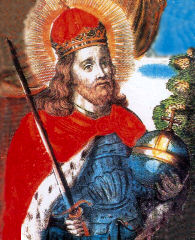HOMILY WEEK 14 06 – Year II
Our Healing Journey of Faith:
Optional Memorial of St. Henry
(Is 6:1-8; Ps 93; Mt 10:24-33)
*********************************************************
“Whoever acknowledges me, I will acknowledge before my Father in heaven.”
That statement is a clear call to believe in Jesus. The readings add the dimension of forgiveness and healing to that call. Acknowledging Jesus, believing in Jesus entails a healing journey of faith.
In the first reading, Isaiah has a powerful vision of God in heaven that includes forgiveness and healing. An angel touches his mouth with a live coal taken from the altar of God that blots out his sin and takes away his guilt. That experience gives him the courage to accept the mission God has planned for him.
In the gospel, Jesus invites us to be his disciples by following him, not trying to be greater than him. That is a call to accept some suffering in our lives, as he accepted to suffer and die for us. We are to follow him through his Paschal Mystery to new life. There may even be some persecution in store for us, as people put us down for the Christian values we try to uphold, such as a respect for all life, from conception to a natural death. We are asked to overcome any fear; trust in God’s love, and be faithful to doing God’s will.
Jesus then adds the dimension of forgiveness and healing to that call, much like the experience of Isaiah. What is in the dark must be brought to the light; what is secret will be proclaimed from the housetops. This is an invitation to us as disciples into a journey of experiencing God’s love as forgiveness and healing. The comment Jesus makes about the value of our souls suggests this is soul work.
Often, in spiritual direction, we become aware of some unfinished business in their lives. We slowly realize we are still carrying some anger and resentment towards those who have hurt us in some way, and find we have to learn to forgive these people from the heart. That can be a deep and profound healing.
We often also come to the realization we are also carrying some guilt and fear around all the people we may have hurt, and find we also have to apologize to those people. In the end, we might ask to celebrate reconciliation, to receive God’s forgiveness for our hurtful actions, and to receive healing for the painful emotions and negative attitudes that led us to act out in hurtful ways. Very much like Isaiah, we have been touched by a live coal a seraph has taken from the altar of God. After a retreat, we often leave with a renewed spirit, empowered to say, like Isaiah, “Here I am, Lord, send me.”

St. Henry
St. Henry II, whom the church honours today, is a good example for us. He lived from 972 to 1024. Descended on both sides from Charlemagne, he was the son of Henry, Duke of Bavaria, and Gisela of Burgundy. In 995, he succeeded his father as duke and in 1002 was chosen to succeed his cousin Otto III as Holy Roman Emperor. The education he received from St. Wolfgang of Regensburg kindled in Henry a lifelong interest in ecclesiastical affairs, which merged with his secular power. He created the See of Bamberg in 1006, built its cathedral, and supported the reforms initiated by the monks at the great monastery of Cluny in France. Known as Henry the Good, he was renowned as a just and clement ruler, a man of prayer and a humble ascetic. He was canonized in 1146 by Pope Eugene III and is a patron of Benedictine Oblates, childless couples, dukes, kings and the physically challenged.
The Eucharist is an act of faith in Jesus as Son of God and Bread of Life. Just by our participation, we experience forgiveness and healing. May our celebration empower us to respond with the zeal of St. Henry and the generosity of Isaiah.



